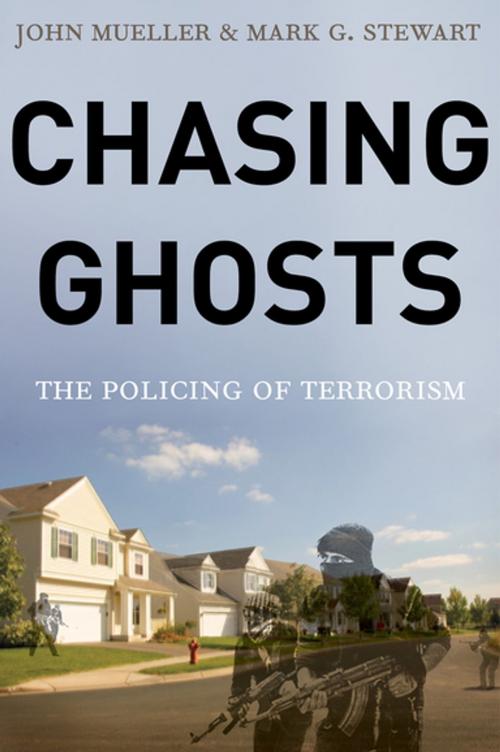Chasing Ghosts
The Policing of Terrorism
Nonfiction, Social & Cultural Studies, Political Science, International, International Security, International Relations| Author: | John Mueller, Mark Stewart | ISBN: | 9780190237332 |
| Publisher: | Oxford University Press | Publication: | November 4, 2015 |
| Imprint: | Oxford University Press | Language: | English |
| Author: | John Mueller, Mark Stewart |
| ISBN: | 9780190237332 |
| Publisher: | Oxford University Press |
| Publication: | November 4, 2015 |
| Imprint: | Oxford University Press |
| Language: | English |
Since 2001, the United States has created or reorganized more than two counterterrorism organizations for every apprehension it has made of Islamists apparently planning to commit terrorism within the country. Central to this massive enterprise is what the FBI frequently calls "ghost-chasing"-the efforts by police and intelligence agencies to follow up on over ten million tips. Less than one alarm in 10,000 fails to be false-the rest all point to ghosts. And the vast majority of the leads deemed to be productive have led to terrorist enterprises that are either trivial or at most aspirational. As John Mueller and Mark G. Stewart suggest in Chasing Ghosts, it is often an exercise in dueling delusions: an extremist has delusions about changing the world by blowing something up, and the authorities have delusions that he might actually be able to overcome his patent inadequacies to do so. Chasing Ghosts systematically examines this expensive, exhausting, bewildering, chaotic, and paranoia-inducing process. It evaluates the counterterrorism efforts of the FBI, the National Security Agency, the Department of Homeland Security, and local policing agencies. In addition, it draws from a rich set of case studies to appraise the capacities of the terrorist "adversary" and to scrutinize "the myth of the mastermind." Mueller and Stewart also look closely at public opinion, a key driving force in counterterrorism efforts. The chance that an American will be killed by a terrorist within the country is about one in four million per year under present conditions. However, poll data suggest that, although over a trillion dollars has been spent on domestic counterterrorism since 2001, Americans say they do not feel safer. No defense of civil liberties is likely to be effective as long as people and officials continue to believe that the threat from terrorism is massive, even existential. The book does not argue that there is nothing for the ghost-chasers to find-the terrorist "adversary" is real and does exist. The question that is central to the exercise-but one the ghost-chasers never really probe-is an important and rather straight-forward one: is the chase worth the effort? Or is it excessive given the danger that terrorism actually presents? As Chasing Ghosts shows in vivid detail, standard evaluative procedures suggest that the costs often far outweigh the benefits.
Since 2001, the United States has created or reorganized more than two counterterrorism organizations for every apprehension it has made of Islamists apparently planning to commit terrorism within the country. Central to this massive enterprise is what the FBI frequently calls "ghost-chasing"-the efforts by police and intelligence agencies to follow up on over ten million tips. Less than one alarm in 10,000 fails to be false-the rest all point to ghosts. And the vast majority of the leads deemed to be productive have led to terrorist enterprises that are either trivial or at most aspirational. As John Mueller and Mark G. Stewart suggest in Chasing Ghosts, it is often an exercise in dueling delusions: an extremist has delusions about changing the world by blowing something up, and the authorities have delusions that he might actually be able to overcome his patent inadequacies to do so. Chasing Ghosts systematically examines this expensive, exhausting, bewildering, chaotic, and paranoia-inducing process. It evaluates the counterterrorism efforts of the FBI, the National Security Agency, the Department of Homeland Security, and local policing agencies. In addition, it draws from a rich set of case studies to appraise the capacities of the terrorist "adversary" and to scrutinize "the myth of the mastermind." Mueller and Stewart also look closely at public opinion, a key driving force in counterterrorism efforts. The chance that an American will be killed by a terrorist within the country is about one in four million per year under present conditions. However, poll data suggest that, although over a trillion dollars has been spent on domestic counterterrorism since 2001, Americans say they do not feel safer. No defense of civil liberties is likely to be effective as long as people and officials continue to believe that the threat from terrorism is massive, even existential. The book does not argue that there is nothing for the ghost-chasers to find-the terrorist "adversary" is real and does exist. The question that is central to the exercise-but one the ghost-chasers never really probe-is an important and rather straight-forward one: is the chase worth the effort? Or is it excessive given the danger that terrorism actually presents? As Chasing Ghosts shows in vivid detail, standard evaluative procedures suggest that the costs often far outweigh the benefits.















